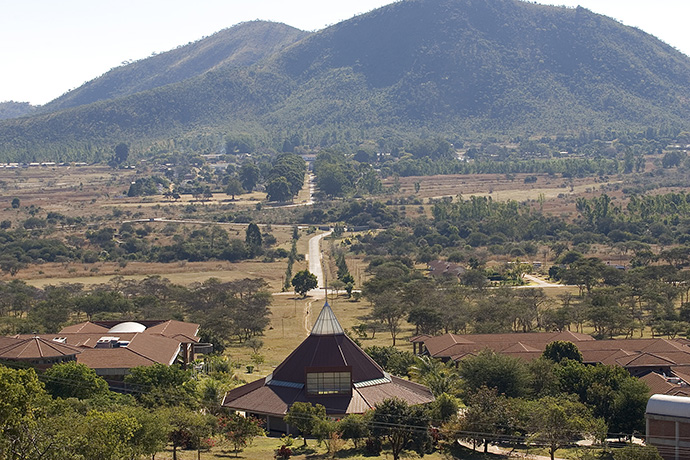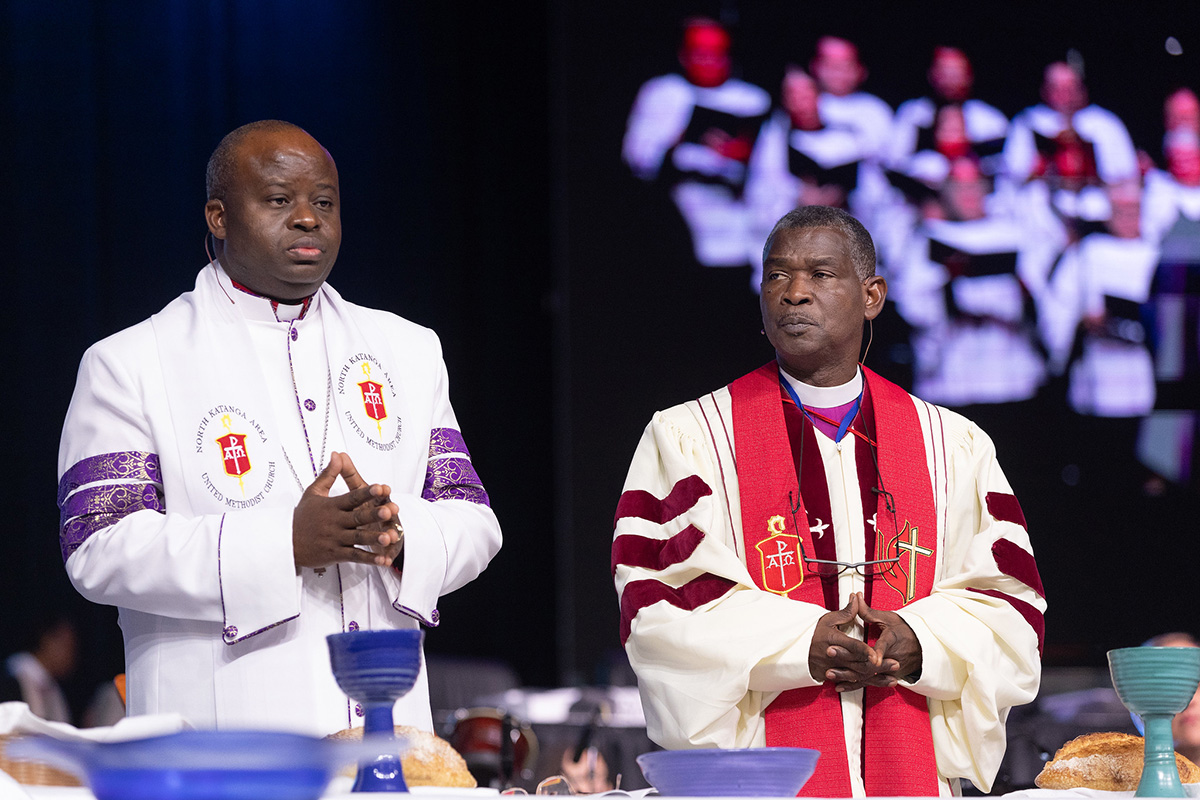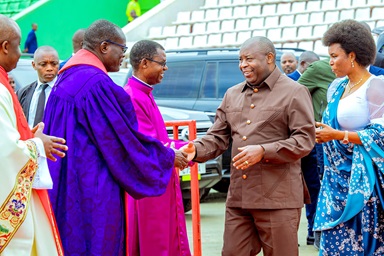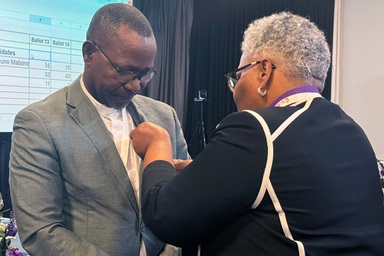Key points:
- Africa University is a hub for leadership preparation and development in Africa and around the world.
- AU graduates expressed hope that after General Conference, United Methodists will maintain their connectionality, despite diversities.
- “Looking at what I am and what I do today in church and society,” said the Rev. Fidelie Nawej, “I feel that the investment in Africa University was not in vain.”
- “Africa University is the beginning of everything I am and do today,” said the Rev. Neusa Marta Pedro Joaquim Ndalamba. “AU opened not only my eyes and mind, but also the world around me.”
As they encounter one another at the Charlotte Convention Center, Africa University graduates experience the same warmth, vibrancy, collaboration and joy that they felt as students at United Methodism’s only pan-African higher education institution located in Old Mutare, Zimbabwe. General Conference approved the school’s creation in 1988, and its doors opened to students a few years later.
“I feel blessed to be part of this important assembly of The United Methodist Church,” said the Rev. Fidelie Nawej, who graduated from Africa University with a bachelor's degree in theology (2008) and a master's from the school’s Institute of Peace, Leadership and Governance (2010).
“Looking at what I am and what I do today in church and society,” he said, “I feel that the investment in Africa University was not in vain.”
Currently, 26 countries are represented at Africa University.
“Since I've been here,” Nawej said, “I've met several former students of various nationalities who studied at Africa University, so I feel like I'm on the AU campus.”
From the Democratic Republic of the Congo, Nawej is at the General Conference collaborating as an interpreter.
"My hope is that at the end of this session, we will continue to maintain our connectionality, despite the diversities in our midst, which we need to learn to deal with," said the Rev. André Vieira from the East Angola Conference, who graduated with a Bachelor of Divinity in 2009.
"Diversities are characteristic of human beings, and for us, that makes us de facto United Methodists," explained Vieira, who also supports regionalization.
Located in the Valley of Hope in Old Mutare, Africa University is often called “the school of dreams.”
Sylvie Kabanga Mbuyi, who studied social sciences and humanities, started in 2001 with intensive English classes — coming from a French-speaking country with no solid knowledge of the language of instruction.
“Besides learning the academic ABCs at AU, I learned the sense of community, of belonging, of Africanness, and lately, I have enriched my social and human understanding at Africa University,” she said. “Being at the General Conference is a great blessing for me. I am helping with translations."
A 2005 Africa University alum, Mbuyi went to Candler School of Theology, earning a Master of Divinity in 2012.
Bernardo Lourenço, another theology graduate from Africa University (2000), is serving as a Portuguese translator at General Conference, a role he’s been doing for over 12 years.

General Conference photos
"By contributing to my church in this way, I feel I am contributing with the gifts and talents I acquired at AU, and I feel continually connected with my brothers and sisters in the connection. And this, indeed, is the beauty of Methodism,” he said.
The average age of Africa University graduates is between 35 and 45.
"My contribution to this conference is in interpretation and translation,” said the Rev. Alfeu Mujongue, a 2013 graduate and a member of the Mozambique South Conference. “It is my first experience, challenging but enjoyable.”
Despite difficulty in obtaining a visa to travel to Charlotte, Mujongue is thrilled to speak about his alma mater.
“It is my prayer,” he said, “to see the funds that support Africa University maintained, because AU continues to be the point where men and women receive quality training.”
Female representation at Africa University is growing in all faculties.
The Rev. Neusa Marta Pedro Joaquim Ndalamba, a former Africa University student, said she went there “because I heard it was a good school with Methodist roots and on the African continent.”
Born in Angola, Ndalamba attended the English preparatory course with classmates from countries whose language of education is different from English.
A 2007 graduate of the Africa University School of Theology, she now exercises pastoral ministry as superintendent of the Kwanza Norte District and vice secretary of the West Angola Conference. She was invited to General Conference to help with translation and interpretation.
"Africa University is the beginning of everything I am and do today," said Ndalamba. "Africa University opened not only my eyes and mind, but also the world around me.”
João da Graça, an 2006 Africa University graduate with a degree in sociology, said, "As a delegate, I was well received from the airport to here. I'm getting good treatment."
Da Graça holds key positions in his episcopal area, Angola West, as director of administrative services and at the Methodist University of Angola as a professor of Methodist history.
Often, after obtaining their degrees, Africa University alumni go to other universities in Africa and beyond.

After acquiring a degree in theology in 2010, the Rev. Ivan Milosi Mumba returned to study at the school’s Institute of Peace, Leadership and Governance before pursuing a Master of Divinity at Wesley Theological Seminary in Washington. He is a Doctor of Ministry candidate at Garrett-Evangelical Theological Seminary in Evanston, Illinois.
Mumba is serving at this General Conference as a translator.
"AU marked my life,” he said. “I learned the language, the culture, the interaction and friendship with other students from other parts of Africa. I learned to be a servant and a leader for the present and the future. Africa University changed my life for the better.”
Today, Africa University includes four colleges and one school, more than 10 courses, and a student body exceeding 2,000.
"Africa University prepared me for leadership ministry within the church and in society," said the Rev. Tsishinen Mpoyo, class of 2007. "Being at this conference is a blessing, and I see that it is partly a result of the preparation I had at AU.”
Mpoyo does pastoral ministry in the Wisconsin Conference and serves as a translator for the Francophone community.
"Africa University paved my way," said the Rev. Laure Kalau, School of Theology (2008). The cultural diversity, the excellent faculty, all empowered me to be an agent of positive change in the world.
Subscribe to our
e-newsletter
“I am from DR Congo, but at AU, I lived and studied with people from different countries, who were able to support me, love me and help me in many ways," Kalau said.
Kalau is an elder and a member of the Katanga South Annual Conference. She currently serves in the North Carolina Conference.
Wehnam Peter Dabale, who earned two degrees at Africa University, said, “When I hear about AU, I see the investment and the future of Africa in all aspects."
A native of Nigeria, Dabale is now on staff at Africa University as an international student advisor, director of alumni affairs, director of internationalization and alumni church relations.
The university currently has 2,032 full-time students, representing 25% international and 75% Zimbabwean.
"Africa University offers a general education, rooted in Christian values,” Dabale said, describing it as an institution “that molds leaders with ethical principles that transform not only Africa, but [also] the whole world.”
At General Conference are students from various countries who are the fruit of the investment in Africa University. Among them are delegates, interpreters, agency staff, former missionaries and a bishop.
"AU has an enviable quality of education, quality of infrastructure, both human and physical, good teachers," Dabale said.
At Africa University for almost 20 years, Dabale is a member of the board of directors and an encouraging leader. He hopes to continue to train leaders for Africa's present and future.
Africa University Chancellor, Bishop Gaspar João Domingos of the West Angola Episcopal Area, looks at the school as "the focal point for the revolution of the African continent, through the training of the leaders of the church and the continent.
"The UMC has been in Africa for almost 200 years, and we never had a school of higher education until almost the 1990s,” he said.
Domingos, chancellor since 2021, said, “We hope that AU will help us tell the story of Africa, and that it will have an African flavor. Africa University has already started producing bishops.”
The North Katanga-Tanganyika Episcopal Area is under the leadership of Bishop Mande Muyombo, who graduated from Africa University in 2006 and 2008, with degrees in divinity and intellectual property law, respectively.
"The church's only pan-African university, which is a gift from God, has made the dream of Africa University a reality," said Muyombo. "This is a ministry that has completely changed my life and the lives of many AU graduates.”
An enthusiastic singer, the bishop was a member of the Africa University choir.
"Africa University has equipped us to face the challenges of the millennium,” he said. “The training I had, and my colleagues at AU developed in us an 'I can' attitude.”
Muyombo is now chairing the Africa University Board of Directors, the first Africa University graduate to do so.
"The university remains the beacon of The UMC as it continues to transform Africa," he said.
Da Cruz is a communicator for the West Angola Annual Conference of United Methodist News based in Luanda. Sambo is Lusophone Africa correspondent for UM News based in Maputo, Mozambique.
News media contact: Julie Dwyer at (615) 742-5470 or [email protected]. To read more United Methodist news, subscribe to the free Daily or Weekly Digests.




